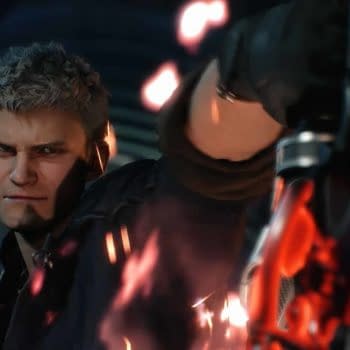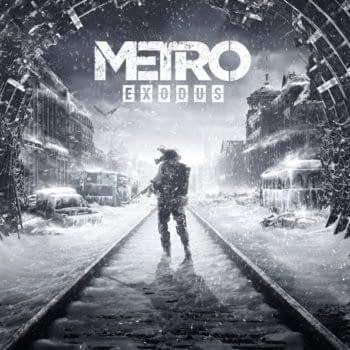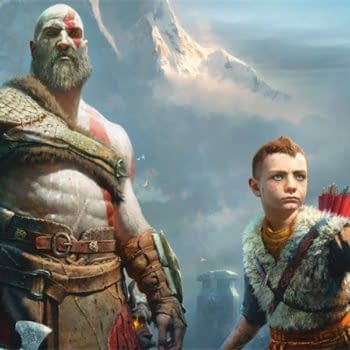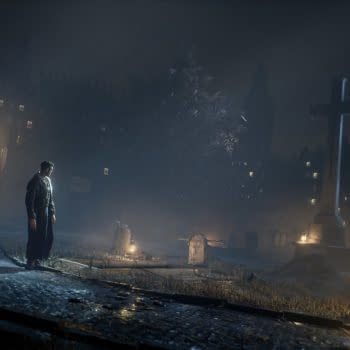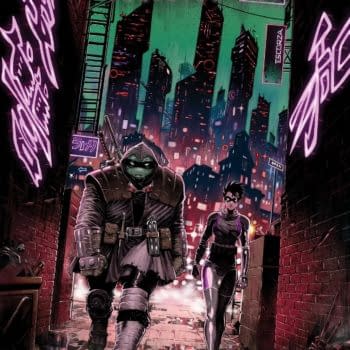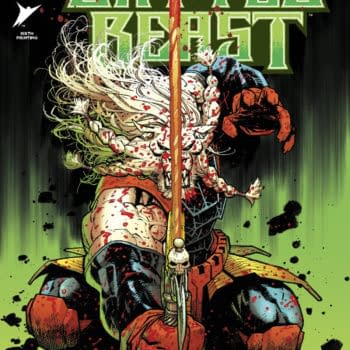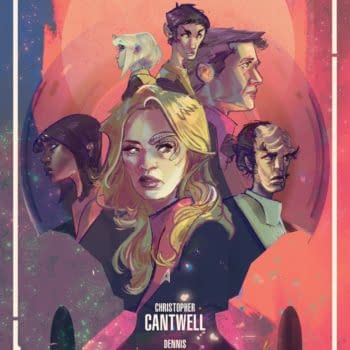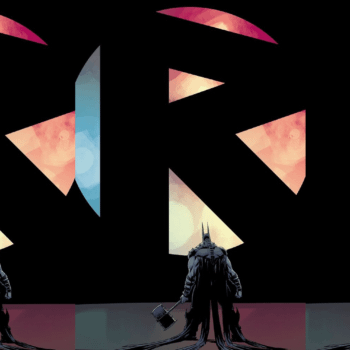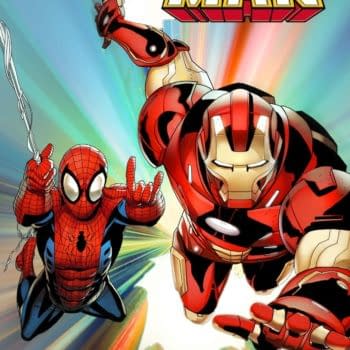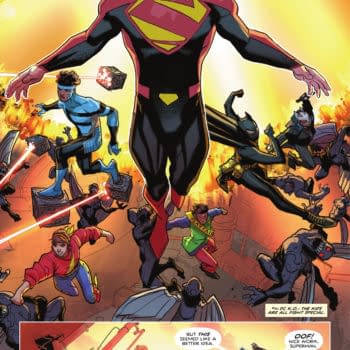Posted in: Comics | Tagged: Comics, entertainment, jerry ordway, terrificon
Talking Terrificon With Mitch Hallock And Jerry Ordway
Shawn Perry writes for Bleeding Cool…
Sup Bleeders,
Get ready to feel the pangs of voyeuristic enlightenment because recently I had the unique pleasure of sitting down with the always-insightful producer of my favorite CT-based Comic Convention, Mitch Hallock, along with comic book legend Jerry Ordway (Death of Superman, Crisis on Infinite Earths) to discuss everything under the sun. Specifically, what geek culture means in an era where the idea that comics are for everyone has never rang more true, but the shadow of negative vibes and the dogma of an imperialist empire still dominate the internet and hallways of society that the oasis of Comic Con has never been more popular or, in some ways, more needed.
For those who do not know I have been covering Hallock's TerrifiCon or, more accurately, the-convention-formerly-known-as-Connecticonn for a few years now and while bigger conventions like NYCC may have more guests I have never been to an event that exudes more passion, love and respect for all forms of geek culture. The event has grown in size and popularity since it's humble beginnings exceeding the capacity of Holiday Inn to it's present incarnation which will be held on August 19th through Sunday the 21st at the Mohegan Sun Casino.
Without further preamble, I met with Hallock and Ordway to talk about TerrifiCon and ended up discussing everything from the origins of geek culture to the dangers of dogmatism in cultural appetites while throwing back enough craft beers to make a booze geek proud at Comix Comedy Lounge in the beautiful Mohegan Sun Casino. It was awesome, hope you like it and come to TerrifiCon.
–
Shawn Perry: So Mitch can you tell us about what fans have to look forward to at TerrifiCon?
Mitch Hallock: Terrificon is Connecticut's Terrific Comic Con. It's what folks expect from a comic con; comic creators, actors, cosplayers, dealers of cool collectibles and family fun, BUT it's a much more than that! It's an event, no I take that back, it's THE EVENT! I'm incorporating the fact that the venue TerrifiCon is held at, the lavish Mohegan Sun Convention Center, had a non stop, 24/7 energy that I'm tapping into to bring non-stop action to the attendees for almost three days! I have been planning the 2016 event since last August, trying to top the last show I produced. Listening to what folks liked and exceed expectations. Heck, I already am talking to guests for 2017. Because when it's called the "TERRIFIC" comic con, you have to turn it up! In a nutshell; TerrifiCon is the greatest thing since sliced bread happening August 19th through the 21st right here in the Mohegan Sun so I have about eight months to put on the greatest show on earth. You'll be glad you came.
SP: Sound awesome, can you tell us a little about what you are looking forward to bringing to the Connecticut people?
MH: It's like a bit of Disney World, there's always…there's always something to see whether you getting in line to get a sketch from your favorite artist or you want to talk to your favorite writer or there's an actor that you loved on a TV show or maybe you want buy the latest Funko-Pop or cool T-Shirt there's always something going on and I have also tried to be more theatrical about it with our live shows. Last year we had the Dark Knight Club and this year we are going to have something else with comedians and singers and writers…you want to buy a ticket and say I can't see it all in one day!
SP: I have to say Mohegan Sun is a great venue because there is so much to do, is there anything new about your surroundings that you would like to utilize this year?
MH: This year we are going to be working with Mohegan Sun on an after-con event on Friday and Saturday where after the show fans can enjoy live comedy here at Comix which is a beautiful 400 seat lounge. We are working on a special guest right now and I can't tell you who just yet but when you hear his name I think you are going to be very excited about it. But again there's more stuff to see from comedians to cosplay to cars…we try to have something for everybody.
SP: One of the reasons I enjoy your shows is that you have a real knowledge of Connecticut's history with comic book culture that I think shines through in your events. You know about Charlton and the origins of the industry as well as all the big names that have come through here.
MH: Oh man I could bore your readers to tears with all the different people that came through here! Because of its proximity to New York a lot of artists and writers have resided here over the years and work in the city. That has been going on for decades so we have a very rich community of creators.
SP: So for all the Millenials out there who are not necessarily comfortable describing themselves as a 'geek' or 'sci-fi fan' or for whom the notion that comic book culture exists in a niche category of society that their friends and other cool people like Alan Moore would consider 'emotionally subnormal' and that might deter them from coming…what do you say to them? What do you say to someone who asks 'what can I gain out of coming other than meeting some guy with pit stains dressed-up?'
MH: I take umbrage to that, whether you are one of the baby-boomers or generation x or y or whatever there is no classification for anyone who enjoys a story and what is right and a hero that does what's right, it's timeless and it goes back to when people were drawing on caves thousands of years ago to the modern Superman vs Batman high-colored blockbuster of today. By virtue of this shared interest you will be accepted at comic-con and you don't care that you're wearing a t-shirt that says 'I love squirrel girl' even though 90% of the world doesn't know what a squirrel girl is…
SP: I'd say more like 99.8%…
MH: …it's all about saying I like this and I don't care what anyone thinks because everyone there is going to accept you because there is just…
Jerry Ordway: There is a vibe in the room.
MH: There is a vibe in the room! Yes!
JO: The vibe is that people like the same stuff that we like whether that is Spider-Man or Hunger Games. It's a hero concept…and, hey, you could meet a girl with pit stains in her shirt, you know what I mean?
SP: You're right a comic con could lead to some new couples getting together, maybe even marriages.
MH: We will not have marriage licenses at the casino, but I think we could as this is a sovereign nation. I'll look into it. We could probably do speed dating.
SP: I did that once at NYCC and it was interesting… I got paired up with a woman dressed as an alien cosplayer, afterward she hailed a cab with a lightsaber. That was kind of cool.
MH: I love this stuff, I wish we could do it every week, but it's not economical. Plus my wife would probably kill me if I did this show every week, but I'll tell you the second that door closes I am thinking 'how many more seconds is it until we can open those doors up;' and I am not bs-ing you, I love this stuff – I am wearing Spider-Man socks right now, man. I am driving here listening to the Star Wars soundtrack. I mean… I wish I was discovering the cure for cancer or solving world hunger, but this is what I love.
SP: While we're on the subject of doing what you love I have to ask you this Jerry – how did you get your start in the industry. You were still only a teenager that had grown up in a bar when you got your start I understand, what drew you to comic books?
JO: Well I don't know if anyone can relate to this, but as a kid when it was ten at night and the streetlights said 'don't walk' I waited. Even if there was no traffic, whatever, I waited for the light. I was always like, the good kid, in my mind I always felt like you should follow the rules and everything. What was always appealing to me was that superheroes always did the right thing even if it wasn't for their personal gain…that was the appeal of Spider-Man. I grew up poor and always felt like I had to prove something, obviously I wanted to get out of whatever bad situation [that created] I wanted to make my mom proud of me…but I was entranced by comics probably from about when I was ten years old.
SP: As the medium evolves…what are your thoughts on how geek culture has become mainstream.
JO: Whenever anything is cool I think that there are people who will try to latch onto it, like; 'hey I'm cool too because I follow this…whatever popular thing at the time…' We all can identify each other in a sense because you know stuff about things that people can't even pretend to know about…you know, you have trivial knowledge of comic book storylines or television shows or science fiction or whatever…and I think that it's great that people are more open about it [now]. When I was a kid I can't remember ever talking to a lot of kids who loved comics. It was during the sixties and early seventies and it was kind of 'my thing' that I drew comics. I had friends in school that didn't really know that I was into comics because they weren't into comics. The fact that conventions exist or you know gathering points like comic book stores is great because all of this stuff is really kind of a way for people to get around and talk. You know, not necessarily in an unproductive or negative way like the internet has become kind of — but places where we would sit around and talk about who was drawing what or admiring some artist or some writer and as it got more open, back in the seventies and eighties, you could actually hear some critical respect for somebody who writes comics. Alan Moore, to me, always felt like the first true great writer in comics and then he got followed up with people like Neil Gaiman and others like that who actually kind of elevated the form, broke some rules along the way, and they are not acknowledged. Neil Gaiman is now an established author and I think that's a big thing, regardless of whether Spider-Man makes a billion dollars at the box office, I think it's nice that it's acceptable.
SP: What do you think about modern comic conventions like TerrifiCon?
JO: Back in the seventies I went to some of the earlier ones and it was always about comics and the vibe was always about what we were reading and what we were doing it wasn't just get [about getting] free stuff from our publisher and, this is my plug for Mitch's show, the thing that always appealed to me about Mitch's show is that they have always had a really good vibe. I have been to plenty of conventions over thirty-some years and some of them feel cutthroat and some of them feel like you are a piece of meat or you are on-display or whatever but at the shows Mitch has done over the last several years the people who are attending the shows are actually fun…they ask great questions and I don't mind talking to these people it's not like talking to somebody who is grilling me, but a fellow fan. There is definitely something special at this show…there is a vibe from my side of the table as much is there is a vibe from the floor and these people can sense it as well if people are accessible and now you have these great conversations where I meet someone in a hallway before I even walk in the room and I'll have a conversation that last for an hour…that's just me. That doesn't always happen either [but] people gravitate towards that.
MH: I have not become biased or jaded. I am sitting here talking to you now and I am wearing a Superman pin which is from a Superman cereal that my dad had – who has been gone for almost twenty years now – but this was his when he was a kid in the forties and fifties and he loved comic books and he introduced me to comic books, ya know? The fact of it is to me it's almost a legacy and I would love to hear of some kid that came to one of my shows and said ' I got my first comic book and I met Jerry Ordway the guy who killed Superman' and then [sometime later] said 'I went on to tell my kids about comic books, about Superman and things like that' because it's about carrying on traditions. It's almost like a garden of people's nostalgia and your childhood. You don't want to corrupt it or sell it out for a dollar just to make money. I am trying to make memories. I remember going to my first convention in New Haven in the seventies and I met Wally Wood who is one of the God's of artwork if you are a comic fan and he was sitting right there and I had my interaction with him and I had my Daredevil comic book that I went home with I opened it up and it was drawn by Wally Wood and I had just bought it for $5 and there was the guy who drew it. I mean we are talking about the George Lucas and Steve Spielbergs of paper! We are talking about the guys who built universes and stories that are just as good as any book or movie you have ever loved and you can pass their work on and that comic book is not going to have new actors or special effects it is going to look exactly the way it looked when these guys drew it or wrote it and there is just something magical about that…
JO: There are people that I have seen at conventions many times over the years and you do recognize these people. I am still a fan, I still buy comics, I still read stuff and I think that's part of it. I'm not going there to sell something or look for work I am going there because it's a way of kind of meeting your audience. I respect that somebody paid $1 to buy a comic in the first place but to me that is the place you go and if it's in crappy environment you can still have fun!
MH: Oh absolutely, if this was in a VFW hall it would still be fun…it's the vibe.
JO: It's the vibe.
MH: To me it's kind of like a ballpark, I just took my kids to the Giants game, because we're Giants fans but…its one of these things, whatever you are a fan of, if it's something your dad or your granddad passed onto you it's something you can pass on too. If you are a true fan of that it's timeless. I can take my kids to a Giants game and still remember sitting there with my dad watching the Giants lose and he can tell me stories about his dad. I think of all the people like your George Lucas and Steve Spielberg and everybody who was inspired by comic books to become great storytellers or innovators of technology like Steve Jobs and it's amazing to me that comics inspired these people to try the unattainable and go ' I am a guy from Wisconsin' or 'I am a guy from Modesto, California and I can do anything that's in the realm of possibility, because I read about it in Buck Rogers.' Verisimilitude. Making the impossible true.
SP: How do you feel about diversity in comics and its impact on the culture?
JO: One of the things that appealed to me as a kid reading comic books was the fact that I didn't know what the artists and writers looked like…I didn't know what color they were, I didn't know any of that and there was something cool about that and in being a comic book creator because your work is basically all you are going to be judged by…you could be a woman creator, you could be black or white or be from any part of the world and you are just judged by your work. It wasn't like someone judging it based on some preconceived notion of who you are or what you believe in or whatever. You love Jack Kirby because of what he did with his work and to find out that he was a terrific guy like I did is a bonus.
MH: You hit the nail on the head. That is one of those old-time American themes growing up my dad would always tell me 'you're as good as your work.' It doesn't matter what the politics are like at the office or who doesn't like who, at the end of the day what did you do, what did you contribute, and to Jerry's point with comics, what's in your hand, the book with the completed artwork that you buy for a few dollars at the shop, that is what they are judged by and not by what someone looks like or where they're from or what their religious beliefs are or anything else. This is what they produced and that is what this is all about.
JO: For me the change in comic book shows, for me, the change even from the nineties, is the fact that there is a larger female audience than there ever was before. Now there are more women at shops and more books covering different subjects and reaching a different audience. When I was doing DC's Captain Marvel my daughter was born and I became much more sensitive to the fact that there wasn't a lot of stuff that was targeted towards her. So that's a big change of the last twenty years where you have women coming out and being identified as geeks or as nerds or whatever. That's kind of a huge thing because nerd was a derogatory comment.
MH: Now it's a sign of pride. People go now 'I'm a nerd, I'm a geek!'
SP: There are even rap songs about it.
JO: But it still comes down to the material itself that's inspiring them, they are being involved in that storyline and it somehow speaks to them.
SP: Geeks With Attitude. GWA.
JO: That's a good one. Do a button.
MH: I'm amazed how there are comic cons everywhere now like Dubai and India. It's that universal myth, every culture has their myth and it's all about what's right and what's wrong and that moral code and here it is being told in story book form in comic books but it appeals to people who live out in Paris and Afghanistan and it amazes me how big a range it covers. When I was a kid growing up I was thinking that this was just something that was in the US.
JO: Well we were one of the big exports. When I did a show in the U.K in the eighties I was amazed at the amount of people who knew my work. It was being reprinted in Spain it was being reprinted in South America. It was an awakening to realize that they were reading these superhero stories that I was basically writing for myself because your audience is generally you — you write for what appeals to you. It worked the other way too and I remember when I moved to CT and started going to Forbidden Planet in the Village, I would buy all these graphic novels from overseas. You could find the French editions with fully painted works and that stuff all helps inform your view. That opened me up to wanting to do more color work, seeing that and pushing for it, and now we're at a point where really everything is painted, ya know?
MH: The conventions have become a natural extension of that culture, because you see it in a bookstore and you see it online, but this is a physical gathering where you can talk to like-minded people. When I was a kid we swapped books and traded for missing issues and now I see people get together and talk about everything from Magic: The Gathering to anime to artwork dealers and it's just so broad…
JO: I would never give up my comics. I would trade for comics, but not if I had to give up something that I wanted [laughs]
MH: I think a lot of the people that come through the door don't even read comics they might just be aware of it from the television and the movies.
JO: But that's cool too.
SP: As long as you like stories…
MH: A good story told well doesn't make a difference what form it takes.
JO: People in comics used to get mad about this and I always felt like if you are inspired by Spider-Man in the cartoon or the comics, it's all good and you hope that they might discover comics at a show cause it's not like it's a competition…
SP: Dogmatism never helps anyone. Not even Kevin Smith.
MH: Stop! I love Kevin Smith, and he knows that too. He's one of us that's gone out and made good! On that note…
The tape curiously stopped recording.
Shawn Perry is a comic book and film enthusiast striving to be here now. He currently rests his head in East Hartford, Connecticut. Tweet him @thesperry and email him about life and your stories at Shawn.Perry88@gmail.com.







